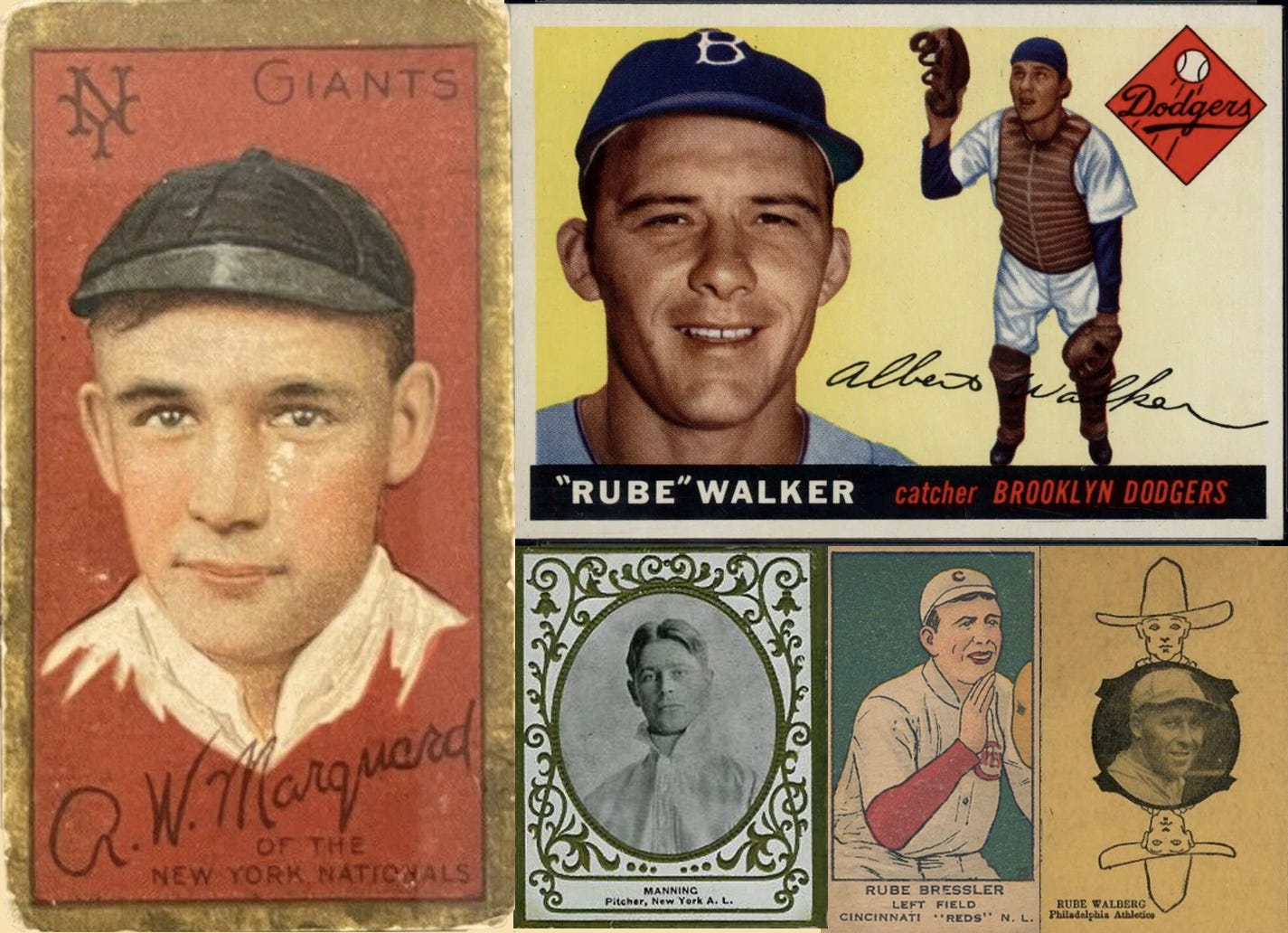All the men cited below were called a Rube by somebody, at some point. And it stuck, enough for it to appear on their Baseball Reference page. And to some degree or another, this derogatory nickname defined who they were.
The most famous of these Rubes would run off the pitching mound to chase a fire truck in the middle of a game. Now that’s a Rube for you. That’s been entirely refuted, but it sounds good. And it’s memorable.
Most of these Rubes were from small, remote towns, naturally. Rube Caldwell’s birthplace of Corydon Township, Pennsylvania, doesn’t exist anymore. A damn was built and now it’s underwater. Can’t get much more remote than that. Caldwell was also famously struck by lighting during a game in 1919. There were two outs in the ninth, and after being unconscious for a several minutes, Caldwell insisted on finishing the game. He retired the next batter to preserve the win. Sometimes a Rube sobriquet is hard earned.
Only three baseball Rubes were born south of the Mason Dixon line (two from North Carolina, one from Arkansas; there is one Texan, but that doesn’t really count, now does it?). The South is where Rubes are Rubes and proud of it. What you gonna do ‘bout it?
On the other hand, Rube Oldring was born in New York City; Rube Schauer in Karmenka, Russia. That’s more Rubles, than Rube.
St. Louis, Cleveland, and Milwaukee supplied Rubes. Those aren’t really Rube towns. Two of our baseball Rubes are Ruebens, and that isn’t hardly a nickname at all. That’s a sandwich. Yet here they are on this list. Being remembered.
Rube Walberg pitched fifteen years in the majors to the tune of 36.6 WAR. That’s a Rick Sutcliffe or a Barry Zito kinda career. He also gave up more home runs to Babe Ruth than any other pitcher. Seventeen. Rube.
Rube Foster claims to have invented the screwball. Sounds like something a Rube would do. (Actually… Foster was a famed pitcher, renowned manager, and founder of the first viable Negro League. He’s in the Hall of Fame.)
Anyway, here’s the whole list:
Thirty-seven Rubes in all. Their baseball totality, at least by Baseball Reference WAR, is 243.5. Pretty good. For perspective, there have been 221 MLB Daves and All The Daves I Know accumulated 596.3 WAR.
Most of these Rubes made their professional debuts between 1897 and 1924, with a handful appearing in the ‘40s when the name must have become retro and cool again. No debuts during World War I. This is a gross generalization, but Rubes went to France and died. They didn’t get to play baseball.
Along with Foster, Rubes Waddell and Marquard rubed all the way to the Baseball Hall of Fame. The former did so by leading the league in strikeouts six years running, when he wasn’t (and he wasn’t) chasing fire trucks; the latter by pitching a streak of nineteen straight wins to start the 1912 season, among other triumphs.
Rube faced Rube in the 1905 World Series when Oldring took Marquard deep for a three-run home. Rube on Rube violence.
Marquard de Rube holds a special place in my heart for another couple reasons. First, he spent a few off-seasons touring the vaudeville circuit, first with Joe Kane, a long-time performer. Kane paired Marquand with his wife Blossom Seeley. The act must have gone well because Seeley left Kane and married Marquard, sparking fodder for tabloids nationwide. The book Marquard & Seeley: A Scandalous Ragtime Romance by Noel Hynd is based on their love affair.
Second, that nineteen-straight win streak for Marquard still stands in 2022. What-with modern pitcher usage, it’s a record not likely to be broken, ever. Not that Pitcher Wins is some kind of metric that actually tells us anything.
It’s not the accomplishment or the man or the statistical improbability that gets me thinking. It’s the REMEMBERING of them that makes me wonder if I will be remembered and why that’s even important.
When you’re dead, you’re dead. There’s no satisfaction in being remembered. There’s no dividend being paid, in any currency (monetarily or emotionally), for the investment you made in being memorable.
Yet we are driven to leave something behind. A novel. A Film. A painting. A Baseball Reference page. Children.
These Rubes excelled. At the very least, they were professional baseballers— of varying degrees, sure, but still. They left something memorable.
And it’s in the remembering that we are inspired to excel like they did. And in turn, inspire someone else to excel as we did, long after we’re gone.
What a bunch of Rubes, indeed.









This piece is a rubes me the right way!
Ironically none of these players are from Aruba.
It took me four months to think of this joke.